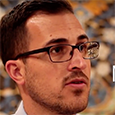Real talk about race

It’s not easy to talk about race in America. Even in this post-Obama election era, or perhaps in reaction to it, candid conversation about racial attitudes can be like dancing across a minefield. Chastity Pratt Dawsey of Bridge Magazine and the Detroit Journalism Cooperative asked Detroit metro-area elected officials and activists to discuss race in their region. Some graciously declined. But others, including activists who deal with race in their work, as well as a mayor who has seen the complexion of his community change, agreed to address racial attitudes, including their own.
Some questions are similar to those posed in a poll ofmetro Detroit residents the DJC is releasing this week and to a Pew national survey on race relations released in June.
Pratt Dawsey interviewed:
Matthew Jaber Stiffler

Matthew Jaber Stiffler, 37, is research and content manager at the Arab American National Museum in Dearborn. His father is white. His mother was born in America and is of Lebanese descent. Stiffler said he was raised as, and thought of himself as, a white child. Other than noting that he was once followed around a mall for wearing a high school letterman’s jacket that signaled that he lived in a working-class white neighborhood, not a rich one, Stiffler said he has never been the target of discrimination. That is, he said, until he reveals his heritage, where he works, or shows support for Arab causes.
Jim Fouts

Jim Fouts, 73, who is white, is mayor of Warren, in Macomb County just north of Detroit. In 1967, many residents in Warren feared violent disturbances in Detroit would come to their neighborhoods if African Americans moved there, he said. African-American Detroiters in recent years have moved to Warren by the thousands, but they didn’t bring riots with them. The formerly white city now also is home to at least four mosques, said Fouts, a former high school teacher. He talks about what it was like growing up in Warren in the 1960s, and taking office after controversial Mayor Mark Steenbergh, who was charged in 1996 with racial intimidation and assault for allegedly choking an African-American teen and calling him the N-word. He was later acquitted.
Kenneth Reed

Kenneth Reed, 48, spokesman for the Detroit Coalition Against Police Brutality, is African American and a resident of Detroit. This interview took place in the midst of the recent spate of police-involved killings nationwide -- after police killed an African-American man in Baton Rouge and another in Minnesota and after a shooter in Dallas killed five police officers; but before another shooter, in Baton Rouge, killed three police.
Adonis Flores

Adonis Flores, 28, is an immigrants rights organizer with Michigan United and a resident of Detroit. He said generations of his relatives found work in America under the Bracero Program, which allowed Mexican workers to come to America to help alleviate the labor shortage that occurred during World War II. Flores was born in Guanajuato, Mexico and was brought illegally to Detroit when he was nine. He supported the Dream Act, a bill that failed in the Senate in 2010. It would have granted undocumented immigrants who came to the U.S. as children the chance to become citizens if they attended college or joined the military. After the bill failed, President Obama signed an executive order that gave people like Flores a temporary work permit that allows them to remain in the U.S., though a recent Supreme Court stalemate may put that status in question.
Monica Lewis-Patrick

Monica Lewis-Patrick, 50, president and CEO of We the People of Detroit, is African American and has lived in Detroit for the past decade. The group advocates for water rights, workers’ rights and housing rights, among other issues, and opposes the state’s controversial emergency manager law. Her family has lived in Detroit since 1952. Her uncle is Willie Horton the famed former Detroit Tigers’ star. We the People was among of 42 researchers and activist groups that collaborated on the upcoming book, “Mapping the Water Crisis: The Dismantling of African American Communities in Detroit,” which is expected to be released Aug. 14.
See what new members are saying about why they donated to Bridge Michigan:
- “In order for this information to be accurate and unbiased it must be underwritten by its readers, not by special interests.” - Larry S.
- “Not many other media sources report on the topics Bridge does.” - Susan B.
- “Your journalism is outstanding and rare these days.” - Mark S.
If you want to ensure the future of nonpartisan, nonprofit Michigan journalism, please become a member today. You, too, will be asked why you donated and maybe we'll feature your quote next time!

